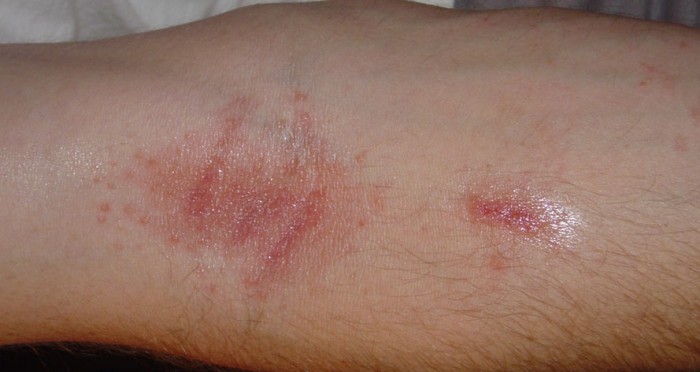Contact dermatitis occurs where the skin reacts after exposure to a substance to which the person is either sensitive or allergic. It is a type of eczema and almost always takes the form of an itchy red rash on the area of skin exposed to the irritant. A classic example is where a rash develops on the finger under a ring or where somebody who spends a lot of time cleaning starts to develop a reaction every time they are exposed to cleaning products. The condition is very common in hairdressers and other occupations with a high level of exposure to chemicals. It often effects the hands, but can be anywhere on the body. There is a risk that the exposed area of skin can become infected.
Symptoms
Symptoms can include a red rash, itchiness, dry, cracked skin and blisters. Usually only the area of skin which was in contact with the irritant is affected, but the rash can spread. The rash can appear very soon after exposure or several days later.
Types of contact dermatitis
Irritant contact dermatitis occurs where the skin develops sensitivity to a particular substance. A minimum level of exposure to the irritant is required to trigger the reaction. Things which may provoke a reaction include soap, over-exposure to water, friction, household cleaning products, moisturizers, nail varnish, cosmetics, solvents and other chemicals.
Unlike irritant contact dermatitis, allergic contact dermatitis is where the body’s immune system responds to contact with an allergen. Even the smallest level of exposure can trigger a reaction. Examples of substances to which the body may react in this way include nickel, sometimes found in watches and jewelry, and certain chemicals found in plants such as poison ivy and poison oak. Some people react where a sticking-plaster is placed on the skin.
A person may have both irritant and allergic contact dermatitis so it is not always easy to distinguish between the two.
Diagnosis
Your doctor or allergist might immediately recognize the skin rash as contact dermatitis. What is important is trying to work out which irritants caused the condition so that these can be avoided in the future.
You may be asked whether the affected area of skin has recently been in contact with particular irritants, or whether you have had a similar reaction before.
A patch test may be done to establish what substances provoke a reaction. In this procedure your allergist may apply small patches containing different substances to your back to observe the reaction. These tests are not always reliable and often the only way to identify the trigger substance is by trial and error.
Treatment
Avoidance of the irritant
Once you have identified what caused your reaction you need to try to avoid that particular irritant in the future. In many countries employers are under an obligation to take reasonable steps to protect their employees from exposure to harmful substances. In extreme cases a change of occupation, for those who work as hairdressers or with solvents may be necessary. If you suffer from “housewife’s eczema” you might find that it helps to wear heavy-duty household gloves when using domestic cleaning products. Look for gloves which contain linings specifically developed for sensitive skin. You may need to avoid certain pieces of jewelry, or to switch to a leather watch strap.
After touching a substance to which your skin is known to react, wash the area thoroughly in warm water with gentle soap.
You may find it helpful to switch to household cleaning products which contain fewer harsh chemicals or only natural products. Try using soaps, moisturizers and cosmetics which have been especially developed for sensitive skin.
Calming a flare-up
Try to avoid scratching the affected area as this may only make it worse and may contribute to bacterial infection. Emollients creams and lotions, which are products based on a mixture of oil and water should be applied regularly to the affected area. Antihistamines may help alleviate symptoms.
Many people with contact dermatitis find that they need a short course of topical steroids to clear up the reaction. Low grade steroid creams can be bought directly from a pharmacist in most countries. For stronger grade steroids you will need a doctor’s prescription. In very bad cases, your doctor may prescribe oral steroids or other treatments.
Photo chemotherapy
In this treatment the skin is exposed to psoralens, a plant- based chemical which increases the skin’s sensitivity to ultra-violet light. The area is then exposed to ultra-violet light. This treatment can be effective, but is not without side-effects.
